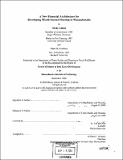A new financial architecture for developing mixed-income housing in Massachusetts
Author(s)
Adnani, Mecky (Adnani-Rofougaran), 1960-; Crabtree, Peter D., 1959-
DownloadFull printable version (9.310Mb)
Other Contributors
Massachusetts Institute of Technology. Dept. of Urban Studies and Planning.
Advisor
W. Todd McGrath.
Terms of use
Metadata
Show full item recordAbstract
The need for affordable housing is as critical now as it has ever been. Mixed-income housing has been adopted by federal policymakers and many state housing agencies as a means to address this pressing issue. Two mixed-income programs with contrasting results are examined and the strengths and weaknesses of each discussed. Based upon the lessons learned, the authors use a variety of financing mechanisms to create a new financial architecture for the development of mixed-income housing in Massachusetts. The thesis begins with a general overview of the history of U.S. housing policy and the current need for affordable housing. It follows with a detailed description of the various mechanisms used to finance and promote the supply of low-income housing. Two mixed-income housing programs, the SHARP Program and the 80/20 Program, are examined. Using a variety of financing mechanisms, a new financial architecture is advanced based upon a new public/private partnership. Current construction and operating costs from the greater Boston area are used to simulate the development and operation costs of an 80/20 project. Growth rates extracted from a portfolio of 23 mixed-income properties financed by the Massachusetts Housing Finance Agency (MHFA) under the SHARP Program are superimposed on a baseline scenario to subject it to the same financial stresses that the SHARP properties experienced during the recession of the early 1990s. The risks and potential returns to the public/private partnership are analyzed and recommendations made so the returns to each party are commensurate with the risks that party bears when investing in mixed-income projects. The Model is run through a variety of sensitivity analyses to measure the impact of changes in key variables on the resulting returns of principle partners. The conclusion drawn is that the long-term viability of mixed-income projects can be tenuous, but with the proper alignment of interests and through the use of carefully interwoven finance mechanisms and public policies, mixed-income projects can help address the affordable housing crisis while successfully meeting the goals of each party to the partnership.
Description
Thesis (Ph.D.)--Massachusetts Institute of Technology, Dept. of Urban Studies and Planning, 2000. Includes bibliographical references (leaves 129-130).
Date issued
2000Department
Massachusetts Institute of Technology. Department of Urban Studies and PlanningPublisher
Massachusetts Institute of Technology
Keywords
Urban Studies and Planning.